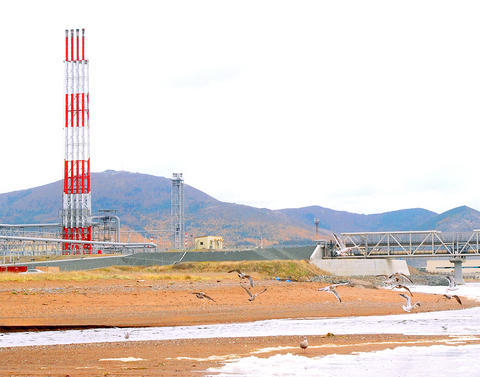In the central square of this once-isolated Russian outpost, Soviet founder Vladimir Lenin's statue is now framed by giant TV advertising screens.
Japanese SUVs stream past restaurants offering European, Indian or Japanese cuisine, packed with diners on weekend nights despite big city prices. Schoolchildren snap pictures of each other on late-model camera phones.
Sakhalin Island, off Russia's Pacific coast, was a prison colony under the czars of the 19th century and a closed-off home to secret air bases during the Cold War. Today, it is enjoying an economic boom driven by high prices for its oil and gas industry.

PHOTO: AP
The Sakhalin Energy international oil and gas consortium, the largest such project on the island and in the world, boasts of pumping US$400 million into the island's infrastructure, including hospitals, roads and aid for indigenous people and the salmon fishing industry. Official unemployment statistics are just above 1 percent, although the actual number is believed to be higher.
Sakhalin's population fell from a high of 710,200 people in 1989, near the end of the Soviet era, to 546,700 in the most recent 2002 census. But locals say the outflow of people has ended and some who left are starting to return.
A visitor's first impression of the island remains typically glum post-Soviet -- a dingy waiting room and only two booths for border police, meaning that passengers flying into Yuzhno-Sakhalinsk, Sakhalin Island's main city, often wait an hour or more to be granted entry.

PHOTO: AP
Yet even there a visitor gets a first hint of the changes. A wall-size signboard from the imposingly named Mega Palace hotel brags of being "the most prestigious and luxurious" accommodation in the city. It's just one of many such establishments that are popping up around Yuzhno-Sakhalinsk, where hordes of foreign workers have driven up prices for rooms at hotels to more than 4,000 rubles (US$163) a night.
Indeed, often the first comment you hear from residents is about the rising cost of living.
For example, the lowest selling price listed for a single-room apartment in a local newspaper is 1.4 million rubles, or US$57,200. It's good news for residents who want to leave and sell their homes, but difficult for people on fixed incomes, such as retirees, or those who want to raise families.
There is also concern about what will happen when the offshore oil and gas platforms, pipelines and other facilities are completed and the construction boom comes to an end.
When regular energy exports begin, it will requiring smaller staffs, with most of the profits going to Moscow and international companies.
"The oil boom is not stable," said Dmitry Litsitsyn, chairman of the activist group Sakhalin Environment Watch.
Yuzhno-Sakhalinsk has come a long way from its 19th century roots.
This city took shape after the Japanese occupied the southern part of the island following the 1905 Russo-Japanese War, building the settlement they called Toyohara -- or "Virgin Valley." The grid street system followed the example of Chicago after its 1871 Great Fire, local historian Igor Samarin said.
The next stage in the city's development came after Japan's defeat in World War II when the Soviets took over the entire island, building the central square with the obligatory Lenin statue and the drab apartment blocks that remain the city's main housing today.
The city has entered a new stage of development in the past two to three years with the oil boom, Samarin said.
Nearly every corner has a store selling mobile phones and new shopping malls stock imported goods like flat-screen TVs and the latest ski equipment. Parks and roads are getting a facelift, and a new gondola is set to ascend to a small ski resort in the mountains framing the city.
An 18-hole golf course is being laid out on the outskirts -- although the heavy winter snows that regularly blanket the island will likely limit time on the links to about half of the year.
"It's just the beginning," Samarin said of the latest stage in Sakhalin's growth. "The Japanese planned the city and the Soviets built it up. The future will be capitalist."
Expatriate workers live in US-style suburban enclaves surrounded by fences for security against threats both human and animal -- namely some 3,000 brown bears that populate the island and can grow to weigh up to 700kg.
The prosperity is shared unevenly. Just next door to the terminus of oil and gas pipelines and Russia's first-ever liquefied natural gas plant, the city of Korsakov is a bleak hamlet where rusting fishing boats lay half-sunken near the shore. Running water flows just twice a day, two hours at a time.
Some hoped that the new homes for workers building the gas plant would be turned over to locals, but Sakhalin Energy instead built its housing right next to the facility -- meaning it must be dismantled because it will be too close for safety when the plant becomes operational next year.
Despite the oil and gas supplies to be exploited here, the island still gets its power from coal-fired generators spewing clouds of haze into the crisp air.
In Yuzhno-Sakhalinsk, 23-year-old photo studio assistant Sergei Chernikh roams around the Lenin statue with his camera. He still dreams of going elsewhere in Russia, worrying what will happen when the oil boom fades.
"We can live another 10 years as long as there is oil," he said. "If there is no oil anymore, the island will die, the foreigners won't be here anymore."

The CIA has a message for Chinese government officials worried about their place in Chinese President Xi Jinping’s (習近平) government: Come work with us. The agency released two Mandarin-language videos on social media on Thursday inviting disgruntled officials to contact the CIA. The recruitment videos posted on YouTube and X racked up more than 5 million views combined in their first day. The outreach comes as CIA Director John Ratcliffe has vowed to boost the agency’s use of intelligence from human sources and its focus on China, which has recently targeted US officials with its own espionage operations. The videos are “aimed at

STEADFAST FRIEND: The bills encourage increased Taiwan-US engagement and address China’s distortion of UN Resolution 2758 to isolate Taiwan internationally The Presidential Office yesterday thanked the US House of Representatives for unanimously passing two Taiwan-related bills highlighting its solid support for Taiwan’s democracy and global participation, and for deepening bilateral relations. One of the bills, the Taiwan Assurance Implementation Act, requires the US Department of State to periodically review its guidelines for engagement with Taiwan, and report to the US Congress on the guidelines and plans to lift self-imposed limitations on US-Taiwan engagement. The other bill is the Taiwan International Solidarity Act, which clarifies that UN Resolution 2758 does not address the issue of the representation of Taiwan or its people in

US Indo-Pacific Commander Admiral Samuel Paparo on Friday expressed concern over the rate at which China is diversifying its military exercises, the Financial Times (FT) reported on Saturday. “The rates of change on the depth and breadth of their exercises is the one non-linear effect that I’ve seen in the last year that wakes me up at night or keeps me up at night,” Paparo was quoted by FT as saying while attending the annual Sedona Forum at the McCain Institute in Arizona. Paparo also expressed concern over the speed with which China was expanding its military. While the US

SHIFT: Taiwan’s better-than-expected first-quarter GDP and signs of weakness in the US have driven global capital back to emerging markets, the central bank head said The central bank yesterday blamed market speculation for the steep rise in the local currency, and urged exporters and financial institutions to stay calm and stop panic sell-offs to avoid hurting their own profitability. The nation’s top monetary policymaker said that it would step in, if necessary, to maintain order and stability in the foreign exchange market. The remarks came as the NT dollar yesterday closed up NT$0.919 to NT$30.145 against the US dollar in Taipei trading, after rising as high as NT$29.59 in intraday trading. The local currency has surged 5.85 percent against the greenback over the past two sessions, central